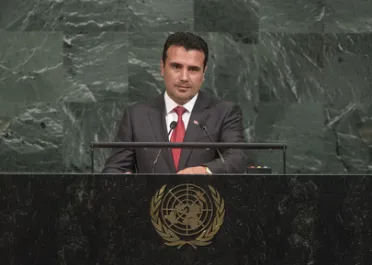Statement
Statement summary
ZORAN ZAEV, Prime Minister of the former Yugoslav Republic of Macedonia, said that human rights violations around the globe, as well as the widespread impunity and lack of accountability, should serve as a reminder to keep the protection of human rights, democracy and the rule of law at the core of all actions. It was also important to focus on preventing violent extremism and radicalization as major factors in the recruitment of terrorists. Noting the divergent approaches to that critical issue, he urged countries “not to focus on our differences”, but rather on “our primary responsibilities to act robustly for the common benefit”.
The proliferation of weapons of mass destruction continued to jeopardize global security, he said, adding that implementation of Security Council resolution 1540 (2004) was therefore fundamental to minimizing the potentially disastrous consequences of their use. The former Yugoslav Republic of Macedonia called for the peaceful denuclearization of the Democratic People’s Republic of Korea and for that country’s adherence to the Comprehensive Nuclear-Test-Ban Treaty.
Turning to sustainable development, he stressed that many issues that were vital to prosperity related to implementation of the 2030 Agenda. In that sense, it was crucial to foster cooperation and build new partnerships to enhance the economic, environmental and social dimensions of sustainability. The former Yugoslav Republic of Macedonia had already undertaken efforts to transform the Sustainable Development Goals into practice by adopting the new United Nations Development Assistance Framework programme “Partnerships for Sustainable Development: UN Strategy 2016‑2020,” he said. Concerning migration and refugees, he said that his country supported the ongoing consultations on the two compacts for refugees and migrants, respectively.
The former Yugoslav Republic of Macedonia had emerged from a deep political and institutional crisis through its firm belief that “democracy needs to be driven by civic engagements from the bottom up,” he said, noting that the Government’s ambitious 3‑6‑9 reform plan prescribed short-, medium- and long-term measures aimed at restoring democracy, building independent institutions and improving living standards. The final goal would be to “expedite integration within the European Union and the North Atlantic Treaty Organization (NATO).”
He said the Government had demonstrated its readiness and capacity to overcome open issues with neighbours, in an atmosphere of mutual respect for each other’s national interests. A concrete example of its good intentions was the signing of the bilateral agreement on friendship, good neighbourliness and cooperation with Bulgaria. As for the 25‑year-long “name issue” dispute with Greece, he said the interim agreement of 1995 had laid the foundations for normalizing relations between that country and his own, and they were implementing confidence-building measures that would lend fresh impetus to their efforts to overcome “the long-standing bilateral dispute”. He commended the efforts of Matthew Nimetz, Personal Envoy of the Secretary‑General, in mediating the dispute.
Full statement
Read the full statement, in PDF format.
Photo

Previous sessions
Access the statements from previous sessions.
